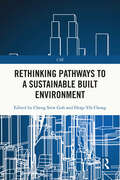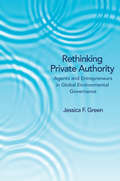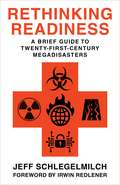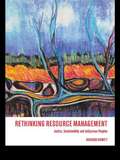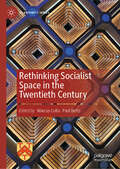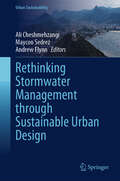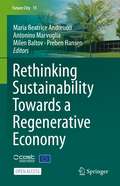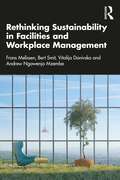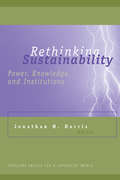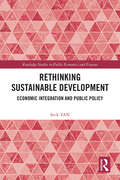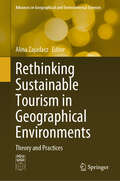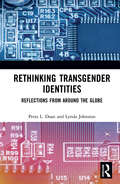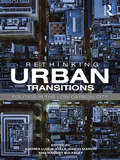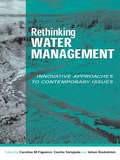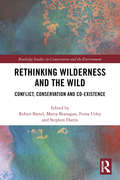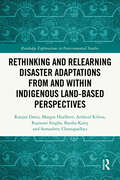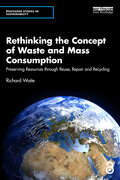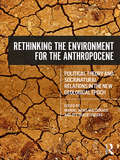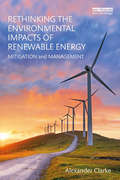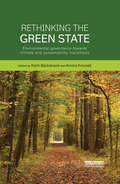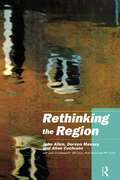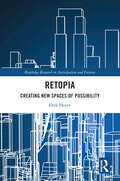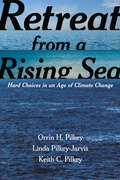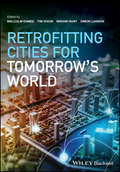- Table View
- List View
Rethinking Pathways to a Sustainable Built Environment (CIB)
by Cheng Siew Goh Heap-Yih ChongThis book aims to provide insights into rethinking pathways in the transition to sustainable built environments in the wake of the pandemic and COP26. It examines our abilities and capabilities to leverage resources to the best use for achieving the universal sustainable development goals. The goal is to identify fresh thinking to make the goals of sustainable built environment more achievable, particularly to align with the national and international targets set by COP26. The book will help address the need for mainstreaming sustainability into the core of decision making of buildings and infrastructure projects throughout the life cycle from planning, to design, construction and operation. This book consolidates a comprehensive body of knowledge of sustainable development that will equip industry professionals, educators, scholars, and students with knowledge and skills to deliver sustainability practice within the built environment. Through theoretical underpinning and presentation of best practices, the book offers solutions to advance the development of sustainability practices in the context of the built environment. The book covers the following content: Sharing of best practice and case studies Review of Sustainability Contemporary Practices in the Built Environment Innovative Net Zero/ Carbon neutral solutions and strategies Sustainable building assessment and certification systems Key Sustainability Deliverables in the Built Environment Social Transition towards Sustainability The book will be of value to interested scholars and practitioners who are involved in sustainable design and engineering practice within the built environment.
Rethinking Private Authority: Agents and Entrepreneurs in Global Environmental Governance
by Jessica F. GreenRethinking Private Authority examines the role of non-state actors in global environmental politics, arguing that a fuller understanding of their role requires a new way of conceptualizing private authority. Jessica Green identifies two distinct forms of private authority--one in which states delegate authority to private actors, and another in which entrepreneurial actors generate their own rules, persuading others to adopt them. Drawing on a wealth of empirical evidence spanning a century of environmental rule making, Green shows how the delegation of authority to private actors has played a small but consistent role in multilateral environmental agreements over the past fifty years, largely in the area of treaty implementation. This contrasts with entrepreneurial authority, where most private environmental rules have been created in the past two decades. Green traces how this dynamic and fast-growing form of private authority is becoming increasingly common in areas ranging from organic food to green building practices to sustainable tourism. She persuasively argues that the configuration of state preferences and the existing institutional landscape are paramount to explaining why private authority emerges and assumes the form that it does. In-depth cases on climate change provide evidence for her arguments. Groundbreaking in scope, Rethinking Private Authority demonstrates that authority in world politics is diffused across multiple levels and diverse actors, and it offers a more complete picture of how private actors are helping to shape our response to today's most pressing environmental problems.
Rethinking Readiness: A Brief Guide to Twenty-First-Century Megadisasters
by Professor Jeffrey SchlegelmilchAs human society continues to develop, we have increased the risk of large-scale disasters. From health care to infrastructure to national security, systems designed to keep us safe have also heightened the potential for catastrophe. The constant pressure of climate change, geopolitical conflict, and our tendency to ignore what is hard to grasp exacerbates potential dangers. How can we prepare for and prevent the twenty-first-century disasters on the horizon?Rethinking Readiness offers an expert introduction to human-made threats and vulnerabilities, with a focus on opportunities to reimagine how we approach disaster preparedness. Jeff Schlegelmilch identifies and explores the most critical threats facing the world today, detailing the dangers of pandemics, climate change, infrastructure collapse, cyberattacks, and nuclear conflict. Drawing on the latest research from leading experts, he provides an accessible overview of the causes and potential effects of these looming megadisasters. The book highlights the potential for building resilient, adaptable, and sustainable systems so that we can be better prepared to respond to and recover from future crises. Thoroughly grounded in scientific and policy expertise, Rethinking Readiness is an essential guide to this century’s biggest challenges in disaster management.
Rethinking Resource Management: Justice, Sustainability and Indigenous Peoples
by Richard HowittThis book offers students and practitioners a sophisticated and convincing framework for rethinking the usual approaches to resource management. It uses case studies to argue that professional resource managers do not take responsibility for the social and environmental consequences of their decisions on the often vulnerable indigenous communities they affect. It also discusses the invisibility of indigenous people' values and knowledge within traditional resource management. It offers a new approach to social impact assessment methods which are more participatory and empowering. The book employs a range of case studies from Australia, North America and Norway.
Rethinking Socialist Space in the Twentieth Century (St Antony's Series)
by Paul Betts Marcus CollaThis edited collection explores the problem of space under socialist regimes in the twentieth century. Bringing together contributions from international scholars with expertise in the architectural, urban, social, and cultural history of twentieth-century socialism, the book includes examples from China, Africa, Mongolia, Eastern Europe and the USSR. The volume reflects on how developments in the field over the past two decades have altered our understanding of how such spaces were constructed (both literally and discursively), how they could become sites of contested meanings, and how they were perceived outside the socialist world. Moreover, the volume is concerned with how scholarly approaches associated with post-colonialism, global history, gender history, and the ‘temporal’ and ‘sensory’ turns have reconfigured our knowledge of, and approach to, the history of socialist space.
Rethinking Stormwater Management through Sustainable Urban Design (Urban Sustainability)
by Ali Cheshmehzangi Andrew Flynn Maycon SedrezThis book provides a different narrative and approach to rethinking stormwater management through sustainable urban design. It delves into design interventions and innovative strategies that lead to solving context-specific issues of flooding, water scarcity, etc. Starting with an overarching introduction and discussion on stormwater management research, the book then primarily focuses on sustainable urban design practices, strategies, and policy guidelines. By summarising a selection of successful global case study examples, the book highlights how we should rethink stormwater management practices and policies from the design perspective. Through sustainable urban design suggestions, the book covers a wide range of conceptual examples to design and policy guidelines, as well as best practices that could be utilised for other contexts. The book is divided into two sections of: (1) architectural and urban design practices and interventions; and (2) policies and action plans. This collection helps researchers and scholars rethink stormwater management and consider innovative - and, more importantly, sustainable - design strategies that could help develop new paradigms and policies for water-related issues in cities and communities. This will interest multiple stakeholders, mainly urban policymakers, planners, urban designers, urban specialists, landscape architects, architects, and urban ecologists. It could be treated as a case study-based guide for governmental units dealing with water related issues in cities and urban areas.
Rethinking Sustainability Towards a Regenerative Economy (Future City #15)
by Preben Hansen Maria Beatrice Andreucci Antonino Marvuglia Milen BaltovThis open access book is based on work from the COST Action “RESTORE - REthinking Sustainability TOwards a Regenerative Economy'', and highlights how sustainability in buildings, facilities and urban governance is crucial for a future that is socially just, ecologically restorative, and economically viable, for Europe and the whole planet. In light of the search for fair solutions to the climate crisis, the authors outline the urgency for the built environment sector to implement adaptation and mitigation strategies, as well as a just transition. As shown in the chapters, this can be done by applying a broader framework that enriches places, people, ecology, culture, and climate, at the core of the design task - with a particular emphasis on the benefits towards health and resilient business practices.This book is one step on the way to a paradigm shift towards restorative sustainability for new and existing buildings. The authors want to promote forward thinking and multidisciplinary knowledge, leading to solutions that celebrate the richness of design creativity. In this vision, cities of the future will enhance users’ experience, health and wellbeing inside and outside of buildings, while reconciling anthropic ecosystems and nature. A valuable resource for scientists and students in environmental sciences and architecture, as well as policy makers, practitioners and investors in urban and regional development.
Rethinking Sustainability in Facilities and Workplace Management
by Bert Smit Frans Melissen Vitalija Danivska Andrew Ngawenja MzembeThis book discusses sustainability within the facility management industry. However, it is not another anthology of so-called best practices and the seemingly endless range of certification schemes. It is also not a (marketing) guide on how to communicate high-pitched sustainability ambitions to potential customers to increase (short-term) market share. Instead, this book is based on the realisation that most facility management businesses and departments actually find it hard to truly integrate sustainability into their strategies, tactics and day-to-day operations in a coherent way. It is also based on the reference point that sustainable development cannot be realised only through technological advancements and new procedures; it requires new behavioural patterns of people. Not only of your own employees, as a supplier or department, but also of those for whom you design, stage and manage optimal workplace experiences. Those patterns will not emerge from nowhere but need to be purposely created and cultivated, based on a thorough understanding of what people and organisations need, want and desire. Through reviewing specific barriers and opportunities related to practical situations and examples at all three levels of facility management – the operational, tactical and strategic level – and supported by the latest theoretical insights, this book provides students and practitioners with inspiration and suggestions for using sustainability as a guideline for improving workplace experience concepts and FM strategies, services and processes. Each chapter uses specific cases and examples as the starting point for reflecting on avenues to move from treating sustainability as an add-on to using it as a powerful concept to create optimal workplace experiences. In doing so, these reflections provide lecturers, students and current and future professionals with practical guidelines and pointers to take sustainability within the facility management industry to a much-needed next level.
Rethinking Sustainability: Power, Knowledge, and Institutions
by Jonathan M. HarrisBringing together the thoughts of economists, political scientists, anthropologists, philosophers, and agricultural policy professionals, this volume focuses on the issues of sustainability in development. Examining such topics as international trade, political power, gender roles, legal institutions, and agricultural research, the contributors focus on the missing links in theory and practice that have been barriers to the achievement of truly sustainable development. Any theory of sustainable development must take into account economic, social, and environmental dimensions. Until recently, the question "What is development?" was often answered predominantly from the economist's perspective, with high priority being assigned to expansion of economic output. Social, political, institutional, and ethical aspects have often been neglected. But now that sustainable development has become a broadly accepted concept, it is impossible to maintain a narrowly economistic view of development. For this reason, the varied perspectives offered by the contributors to this volume are crucial to understanding the process of development as it relates to environmental sustainability and human well-being. The selection of articles is meant to be stimulating and provocative rather than comp-rehensive. They are roughly divided between those dealing with broad theoretical issues concerning the economic, political, and social aspects of development (Part I) and those presenting more applied analysis (Part II). The common thread is a concern for examining which factors contribute to making development socially just and environmentally sound. Rethinking Sustainability will be of interest to economists and social scientists, development professionals, and instructors seeking to offer their students a broad perspective on development issues.
Rethinking Sustainable Development: Economic Integration and Public Policy (Routledge Studies in Public Economics and Finance)
by Seck TANThis book demonstrates falsified economic performance of global economies when the environment is not recognised as a capital, and when the ecosystem is overlooked towards sustainable development.Seck begins with an analysis of standard macroeconomic framework and policy practice. He argues, with reference to environmental accounting literature, that environmental capital must form an integral component of economic measurement. This paves the way for an alternative environmental-macroeconomics framework for policy analysis that promotes sustainable development. The book demonstrates how environmental capital can be measured with reference to select OECD countries and provides a methodology for analysing how macroeconomic goals are related to a steady-state economy. Seck then concludes with a summary of the conflict between current economic growth and ecosystem preservation, and outlines possible policy improvements and directions for research.Rethinking Sustainable Development is an invaluable reference for policymakers as well as researchers and students of environmental economics, sustainable development, and macroeconomics.
Rethinking Sustainable Tourism in Geographical Environments: Theory and Practices (Advances in Geographical and Environmental Sciences)
by Alina ZajadaczThis book covers the current escalation of social problems related to the unstable political situation, economic crisis, as well as growing problems related to the state of the natural environment (existential climate crisis; pollution of land, oceans, and the atmosphere; severe declines in biodiversity) which requires a new rethinking of the sustainable tourism paradigm, in relation to the realities of the modern world, based on the practices observed in the tourist services sector. „Tourism is like fire, you can cook food on it, you can also burn down your house”—says the proverb. On the one hand, it allows for the regeneration of physical and mental strength of visitors, as well as provides funds for the economic development of the destination, but on the other hand, it contributes to a lot of damage to the geographical environment. The period of "stopping" of tourism during the lockdown caused by the COVID-19 pandemic allowed many areas to be relieved of the tourist traffic, which resulted in the observed revitalization of the natural environment, but also huge social and economic problems in destinations that are largely dependent on income from tourism. The rapid resurgence of tourism after the pandemic restored revenues but also caused many social tensions. The problem of overtourism returned, and residents protested, calling for "tourists to go home." The entire tourism system requires a thorough analysis of the complex consequences of its development. This book presents many challenges facing contemporary tourism. Its theoretical and practical aspects provide a useful knowledge base for both researchers studying changes in tourism and practitioners in the tourism services sector. The content also serves as an inspiration to search for optimal solutions aimed at the sustainable development of contemporary and future tourism.
Rethinking Transgender Identities: Reflections from Around the Globe
by Petra L. Doan Lynda JohnstonThis volume explores the diversity and complexity of transgender people’s experiences and demonstrates that gendered bodies are constructed through different social, cultural and economic networks and through different spaces and places. Rethinking Transgender Identities brings together original research in the form of interviews, participatory methods, surveys, cultural texts and insightful commentary. The contributing scholars and activists are located in Aotearoa New Zealand, Brazil, Canada, Catalan, China, Japan, Scotland, Spain, and the United States. The collection explores the relationship between transgender identities and politics, lived realities, strategies, mobilizations, age, ethnicity, activisms and communities across different spatial scales and times. Taken together, the chapters extend current research and provide an uthoritative state-of-the-art review of current research, which will appeal to cholars and graduate students working within the fields of sociology, gender studies, sexuality and queer studies, family studies, media and cultural studies, psychology, health, law, criminology, politics and human geography.
Rethinking Urban Transitions: Politics in the Low Carbon City
by Harriet Bulkeley Simon Marvin Andrés Luque-AyalaRethinking Urban Transitions provides critical insight for societal and policy debates about the potential and limits of low carbon urbanism. It draws on over a decade of international research, undertaken by scholars across multiple disciplines concerned with analysing and shaping urban sustainability transitions. It seeks to open up the possibility of a new generation of urban low carbon transition research, which foregrounds the importance of political, geographical and developmental context in shaping the possibilities for a low carbon urban future. The book’s contributions propose an interpretation of urban low carbon transitions as primarily social, political and developmental processes. Rather than being primarily technical efforts aimed at measuring and mitigating greenhouse gases, the low carbon transition requires a shift in the mode and politics of urban development. The book argues that moving towards this model requires rethinking what it means to design, practise and mobilize low carbon in the city, while also acknowledging the presence of multiple and contested developmental pathways. Key to this shift is thinking about transitions, not solely as technical, infrastructural or systemic shifts, but also as a way of thinking about collective futures, societal development and governing modes – a recognition of the political and contested nature of low carbon urbanism. The various contributions provide novel conceptual frameworks as well as empirically rich cases through which we can begin to interrogate the relevance of socio-economic, political and developmental dimensions in the making or unmaking of low carbon in the city. The book draws on a diverse range of examples (including ‘world cities’ and ‘ordinary cities’) from North America, South America, Europe, Australia, Africa, India and China, to provide evidence that expectations, aspirations and plans to undertake purposive socio-technical transitions are both emerging and encountering resistance in different urban contexts. Rethinking Urban Transitions is an essential text for courses concerned with cities, climate change and environmental issues in sociology, politics, urban studies, planning, environmental studies, geography and the built environment.
Rethinking Water Management: Innovative Approaches to Contemporary Issues
by Johan Rockström Cecilia Tortajada Caroline M FiguèresIf water resources are to be distributed efficiently, equitably and cost-effectively in this rapidly changing world, then it is clear that current water management practices are no longer feasible. Innovative approaches are required to meet the increasing water demands of a growing world population and economy and the needs of the ecosystems supporting them. New approaches have to be employed at global, national and local levels. In Rethinking Water Management, a new generation of water experts from around the world examine the critical challenges confronting the water profession, including rainwater and groundwater management, recycling and reuse, water rights, transboundary access to water and financing of water. They offer important new perspectives on the use, management and conservation of fresh water, in terms of both quantity and quality, for the domestic, agricultural and industrial sectors, and show how a new set of paradigms can be applied to successfully manage water for the future. Caroline Figueres is Head of the Urban Infrastructure Department at UNESCO-IHE Water Education Institute in The Netherlands. Cecilia Tortajada is Vice President of the Third World Centre for Water Management in Mexico and Vice President-elect of the International Water Resources Association. Johan Rockström is Water Resources Expert at UNESCO-IHE.
Rethinking Wilderness and the Wild: Conflict, Conservation and Co-existence (Routledge Studies in Conservation and the Environment)
by Stephen Harris Marty Branagan Robyn Bartel Fiona UtleyRethinking Wilderness and the Wild: Conflict, Conservation and Co-existence examines the complexities surrounding the concept of wilderness. Contemporary wilderness scholarship has tended to fall into two categories: the so-called ‘fortress conservation’ and ‘co-existence’ schools of thought. This book, contending that this polarisation has led to a silencing and concealment of alternative perspectives and lines of enquiry, extends beyond these confines and in particular steers away from the dilemmas of paradise or paradox in order to advance an intellectual and policy agenda of plurality and diversity rather than of prescription and definition. Drawing on case studies from Australia, Aoteoroa/New Zealand, the United States and Iceland, and explorations of embodied experience, creative practice, philosophy, and First Nations land management approaches, the assembled chapters examine wilderness ideals, conflicts and human-nature dualities afresh, and examine co-existence and conservation in the Anthropocene in diverse ontological and multidisciplinary ways. By demonstrating a strong commitment to respecting the knowledge and perspectives of Indigenous peoples, this work delivers a more nuanced, ethical and decolonising approach to issues arising from relationships with wilderness. Such a collection is immediately appropriate given the political challenges and social complexities of our time, and the mounting threats to life across the globe. The abiding and uniting logic of the book is to offer a unique and innovative contribution to engender transformations of wilderness scholarship, activism and conservation policy. This text refutes the inherent privileging and exclusionary tactics of dominant modes of enquiry that too often serve to silence non-human and contrary positions. It reveals a multi-faceted and contingent wilderness alive with agency, diversity and possibility. This book will be of great interest to students and scholars of conservation, environmental and natural resource management, Indigenous studies and environmental policy and planning. It will also be of interest to practitioners, policymakers and NGOs involved in conservation, protected environments and environmental governance.
Rethinking and Relearning Disaster Adaptations from and within Indigenous Land-Based Perspectives (Routledge Explorations in Environmental Studies)
by Ranjan Datta Margot Hurlbert Arifatul Kibria Rajmoni Singha Barsha Kairy Somashree ChattapadhyaThis book offers a critical exploration into Indigenous knowledge systems, particularly focusing on Indigenous land-based knowledge and practice in reshaping disaster adaptations.Drawing from Indigenous communities in Bangladesh, this book challenges transformational approaches to disaster resilience by centering on land-based perspectives intrinsic to Indigenous cultures. The book showcases how Indigenous and land-based minority communities in Bangladesh have historically coped with and adapted to environmental challenges. It navigates beyond the Eurocentric paradigm, acknowledging the richness of traditional Indigenous land-based knowledge and practice embedded in the relationship between Indigenous peoples, land-based minority communities, and their natural environments. The book focuses on the interconnectedness of Indigenous land-based knowledge, culture, and sustainable practices, providing a blueprint for rethinking contemporary disaster adaptation strategies. By relearning from Indigenous land-based perspectives, readers gain invaluable insights into holistic, community-based approaches prioritizing harmony with nature over technological fixes. Through Indigenist, decolonial, relational, and feminist theoretical research frameworks, the book advocates for a paradigm shift in disaster management, emphasizing the importance of respecting and integrating Indigenous land-based solutions.Rethinking and Relearning Disaster Adaptations from and within Indigenous Land-Based Perspectives emerges as a crucial resource for scholars, policymakers, and practitioners seeking to foster resilience through a more inclusive and culturally sensitive lens.
Rethinking the Concept of Waste and Mass Consumption: Preserving Resources through Reuse, Repair and Recycling (Routledge Studies in Sustainability)
by Richard WaiteThis book presents hard facts, drawn from extensive research, to highlight our unsustainable consumption of the Earth’s resources and the limitations of the UK’s current management of waste and recycling.Setting out a bleak picture of a world in which we are literally consuming our planet, the book explores the psychological, economic and capitalist drivers behind this behaviour. Controversially, the book examines the drawbacks of the current approach adopted by many local authorities on the kerbside collection of recyclable materials, as well as the UK governments’ strategic approaches to household recycling, including the lack of UK- wide infrastructures for packaging reuse, and for product repair and recycling. It challenges the whole concept of waste, leading to a proposed new strategy for the management of household waste, including a simplified household collection system, the introduction of an incineration tax and the banning of all household waste exports. The author proposes reconceptualising waste as unwanted but valuable material and argues that the responsibility for facilitating reuse, repair and recycling, rests with manufacturers who must start designing with the end in mind.Given the current economic climate, and a dampening of the green agenda within UK politics, the book provides a much- needed call for critical discourse on how, and how much, we consume and sets out clear, practical solutions for change. The book will be of interest to manufacturers, retailers, consumers, local authorities, policy makers, students and professionals looking to reduce our impact on the environment.
Rethinking the Environment for the Anthropocene: Political Theory and Socionatural Relations in the New Geological Epoch
by Manuel Arias-Maldonado Zev TrachtenbergThis book brings together the most current thinking about the Anthropocene in the field of Environmental Political Theory ('EPT'). It displays the distinctive contribution EPT makes to the task of thinking through what 'the environment' means in this time of pervasive human influence over natural systems. Across its chapters the book helps develop the idea of 'socionatural relations'—an idea that frames the environment in the Anthropocene in terms of the interconnected relationship between human beings and their surroundings. Coming from both well-established and newer voices in the field, the chapters in the book show the diversity of points of view theorists take toward the Anthropocene idea, and socionatural relations more generally. However, all the chapters exemplify a characteristic of work in EPT: the self-conscious effort to provide normative interpretations that are responsive to scientific accounts. The Introduction explains the complicated interaction between science and EPT, showing how it positions EPT to consider the Anthropocene. And the Afterword, by a pioneer in the field, relates all the chapters to a perspective that has been deeply influential in EPT. This book will be of interest to scholars already engaged in EPT. But it will also serve as an introduction to the field for students of Political Theory, Philosophy, Environmental Studies, and related disciplines, who will learn about the EPT approach from the Introduction, and then see it applied to the pressing question of the Anthropocene in the ensuing chapters. The book will also help readers interested in the Anthropocene from any disciplinary perspective develop a critical understanding of its political meanings.
Rethinking the Environmental Impacts of Renewable Energy: Mitigation and management
by Alexander ClarkeRenewable energy is important as a substitute for finite fossil fuels and inflexible nuclear power and could conceivably power the world. However, this is challenging as the world is currently 80% dependent on fossil fuels, and renewable sources produce only about 15% of total energy. Conversion technologies for use with many of the eight different primary sources of renewable energy are only just emerging as viable technologies. While renewable energy sources will not run out, and their use involves little or no release of carbon dioxide or ionising wastes, they do have local environmental impacts of their own. This book analyses the nature of environmental impacts from renewable sources. A novel method of assessing impacts is explored based on a set of parameters centred on how diffuse or concentrated the energy flow is. The approach that is developed will inform engineers, designers, policy makers and planners as well as researchers in the area.
Rethinking the Green State: Environmental governance towards climate and sustainability transitions (Routledge Studies in Sustainability)
by Karin Bäckstrand Annica KronsellThis innovative book is one of the first to conduct a systematic comprehensive analysis of the ideals and practices of the evolving green state. It draws on elements of political theory, feminist theory, post-structuralism, governance and institutional theory to conceptualise the green state and advances thinking on how to understand its emergence in the context of climate and sustainability transitions. Focusing on the state as an actor in environmental, climate and sustainability politics, the book explores different principles guiding the emergence of the green state and examines the performance of states and institutional responses to the sustainable and climate transitions in the European and Nordic context in particular. The book’s unique focus on the Nordic countries underlines the important to learn from Nordics, which are perceived to be in the forefront of climate and sustainability governance as well as historically strong welfare states. With chapter contributions from leading international scholars in political science, sociology, economics, energy and environmental systems and climate policy studies, this book will be of great value to postgraduate students and researchers working on sustainability transitions, environmental politics and governance, and those with an area studies focus on the Nordic countries.
Rethinking the Region: Spaces of Neo-Liberalism
by John Allen Doreen Massey Allan Cochrane Nick Henry with Julie Charlesworth Gill Court Phil SarreRethinking the Region argues that regions are not simply bounded spaces on a map. This book uses unique research of England during the 1980s to show how regions are made and unmade by social processes. The book examines how new lines of division both social and geographical were laid down as free-market growth and reconstructed this are as a `neo-liberal' region. The authors argue that a more balanced form of growth is possible - within and between regions as well as between social groups. This book shows that to grasp the complexities of growth we must rethink `the region' in time as well as in space.
Retopia: Creating New Spaces of Possibility (Routledge Research in Anticipation and Futures)
by Dirk HoyerRetopia tells the story of social innovation in times of crisis, and through its cross-disciplinary narrative it goes beyond existing forms of future anticipation and maps out a practice-based approach to the creation of new realities. It explores how new imaginaries, social experiments, and laboratories of societies can create spaces of possibilities, revalidate the peripheries, and create new forms of social coherence. The peripheral regions in Europe are facing a crisis triangle: depopulation, the rise of the ‘useless’ class, and outdated social welfare systems. It is a crisis of political imaginaries and a lack of inspiring political stories. In response to this, the book specifically focuses on the concept of ‘retopia’, the idea of creating inclusive spaces of social innovation that encourage active participation. Through the creation of relocalized societies with a high degree of autonomy in ‘leftover’ spaces, such as Sicily, Western Latvia, or Northern Bulgaria, retopian redevelopment schemes offer new perspectives on ‘ruined spaces’. Retopia uncovers the common links and limitations of utopian studies, future studies, degrowth, narratology, the commons, and political geography. Retopia: Creating New Spaces of Possibility is an articulation of the potentialities of social innovation, political imaginaries, and future images, provoking a stimulating discussion among scholars and students in the fields of Politics and Future and Anticipation Studies.
Retreat from a Rising Sea: Hard Choices in an Age of Climate Change
by Orrin H. Pilkey Linda Pilkey-Jarvis Keith C. PilkeyMelting ice sheets and warming oceans are causing the seas to rise. By the end of this century, hundreds of millions of people living at low elevations along coasts will be forced to retreat to higher and safer ground. Because of sea-level rise, major storms will inundate areas farther inland and will lay waste to critical infrastructure, such as water-treatment and energy facilities, creating vast, irreversible pollution by decimating landfills and toxic-waste sites. This big-picture, policy-oriented book explains in gripping terms what rising oceans will do to coastal cities and the drastic actions we must take now to remove vulnerable populations.The authors detail specific threats faced by Miami, New Orleans, New York, and Amsterdam. Aware of the overwhelming social, political, and economic challenges that would accompany effective action, they consider the burden to the taxpayer and the logistics of moving landmarks and infrastructure, including toxic-waste sites. They also show readers the alternative: thousands of environmental refugees, with no legitimate means to regain what they have lost. The authors conclude with effective approaches for addressing climate-change denialism and powerful arguments for reforming U.S. federal coastal management policies.
Retreat from a Rising Sea: Hard Choices in an Age of Climate Change
by Orrin H. Pilkey Linda Pilkey-Jarvis Keith C. PilkeyThis sobering examination of climate-change and the disastrous effects of rising sea levels explains what must be done to avoid the worst outcomes. By the end of this century, hundreds of millions of people living at low elevations along coasts will be forced to retreat to higher and safer ground. Because of sea-level rise, major storms will inundate areas farther inland and will lay waste to critical infrastructure, such as water-treatment and energy facilities, creating vast, irreversible pollution by decimating landfills and toxic-waste sites. Retreat from a Rising Sea explains in gripping terms what rising oceans will do to coastal cities—detailing the specific threats faced by Miami, New Orleans, New York, and Amsterdam. This policy-oriented book then lays out the drastic actions we must take now to remove vulnerable populations. Aware of the overwhelming social, political, and economic challenges that would accompany effective action, the authors consider the burden to the taxpayer and the logistics of moving landmarks and infrastructure, including toxic-waste sites. They also show readers the alternative: thousands of environmental refugees, with no legitimate means to regain what they have lost. The authors conclude with effective approaches for addressing climate-change denialism and powerful arguments for reforming U.S. federal coastal management policies.
Retrofitting Cities for Tomorrow's World
by Tim Dixon Malcolm Eames Miriam Hunt Simon LannonA groundbreaking exploration of the most promising new ideas for creating the sustainable cities of tomorrow The culmination of a four-year collaborative research project undertaken by leading UK universities, in partnership with city authorities, prominent architecture firms, and major international consultants, Retrofitting Cities for Tomorrow's World explores the theoretical and practical aspects of the transition towards sustainability in the built environment that will occur in the years ahead. The emphasis throughout is on emerging systems innovations and bold new ways of imagining and re-imagining urban retrofitting, set within the context of 'futures-based' thinking. The concept of urban retrofitting has gained prominence within both the research and policy arenas in recent years. While cities are often viewed as a source of environmental stress and resource depletion they are also hubs of learning and innovation offering enormous potential for scaling up technological responses. But city-level action will require a major shift in thinking and a scaling up of positive responses to climate change and the associated threats of environmental and social degradation. Clearly the time has come for a more coordinated, planned, and strategic approach that will allow cities to transition to a sustainable future. This book summarizes many of the best new ideas currently in play on how to achieve those goals. Reviews the most promising ideas for how to approach planning and coordinating a more sustainable urban future by 2050 through retrofitting existing structures Explores how cities need to govern for urban retrofit and how future urban transitions and pathways can be managed, modeled and navigated Offers inter-disciplinary insights from international contributors from both the academic and professional spheres Develops a rigorous conceptual framework for analyzing existing challenges and fostering innovative ways of addressing those challenges Retrofitting Cities for Tomorrow's World is must-reading for academic researchers, including postgraduates insustainability, urban planning, environmental studies, economics, among other fields. It is also an important source of fresh ideas and inspiration for town planners, developers, policy advisors, and consultants working within the field of sustainability, energy, and the urban environment.
